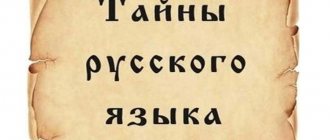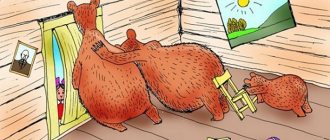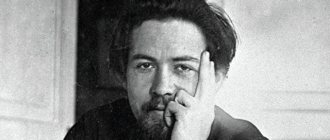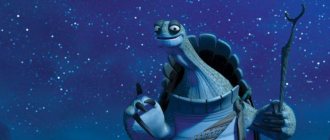“Ionych”: summary
A distinctive feature of Anton Chekhov's work has always been the bright, extraordinary characteristics of the heroes. The subtle skill of words allowed the writer to create such images in order to ridicule the shortcomings of society and present his ideas without further ado. An exemplary work in this regard that Chekhov created is “Ionych”. A summary of the story will introduce its characters and plot, and will also become the basis for analyzing the author’s message:
Anton Pavlovich Chekhov: “Ionych” in brief
Guests of the provincial town of S. found him very boring. But the residents themselves claimed that it has a lot of interesting things: a theater, a library, clubs, as well as talented, educated individuals with whom it is pleasant to communicate on any topic. The Turkin family was one of them:
- The father of the family, Ivan Petrovich, was a handsome man and loved to joke a lot. He often staged performances for guests and acted in them himself.
- His wife, Vera Iosifovna, wrote novels and read them to guests every time.
- The couple had a daughter, Ekaterina, whom her parents affectionately called Kotik. The girl played the piano and read a lot.
The Turkins received guests with pleasure. One day, the main character of the story, Dmitry Ionovich Startsev, also received an invitation.
The young doctor Startsev was appointed zemstvo doctor in a village located near the city of S. He worked enthusiastically all winter and was able to visit the Turkins only in the spring. He enjoyed being their guest: Ivan Petrovich entertained the whole evening, Vera Iosifovna read out her works, and young Kotik played the piano. This is what Startsev found out about the girl that evening:
- She did not study at the gymnasium: her parents invited teachers to their homes to protect their daughter from the harmful influence of her peers.
- Kitty dreamed of entering the Moscow Conservatory, although her mother objected.
In general, the Turkins seemed to Startsev to be cultured and entertaining people. He didn’t mind visiting them again, but for a year he never found the time because of work. One day Vera Iosifovna wrote to the doctor: she suffered from migraines and asked for help. Startsev cured her, after which the woman began praising him to her guests.
Anton Chekhov: Ionych fell in love
The doctor began to visit the Turkins more and more often, but not because of Vera Iosifovna’s migraine, but for the sake of young Catherine. Startsev admired her:
- The cat was fresh and graceful;
- She seemed smart beyond her years, although sometimes she could laugh out of place or make a ridiculous remark.
Still from the film “In the City of S.”: YouTube/LFV
The doctor unsuccessfully sought an opportunity to be alone with the girl. One day she called Startsev on a date... to the cemetery. Realizing that this was a joke, the young man still went to meet his lover and wandered alone for a long time.
The next day, Startsev decided to propose to Kotik. Sitting at the hairdresser, the doctor thought:
- that he will have to give up service in the village and move to the city;
- about dowry;
- that Kitty is spoiled and does not suit him (but he drove away these thoughts).
But the date did not happen: the girl was going to a dance. Startsev volunteered to give him a ride and kissed the girl on the way, but she was cold. In the evening, the doctor came to the club where Kotik was dancing and asked her to marry. But Catherine refused: the girl did not want to tie the knot, but dreamed of leaving and making a musical career.
The refusal seriously hurt Startsev’s pride: he could not find a place for himself, felt sorry for himself and his unrequited feelings. I felt better when the doctor found out that Kitty had gone to Moscow to study.
Brief retelling: Ionych a few years later
Four years have passed, and Startsev has changed. Ionych lived a boring life:
- he worked mainly in the city, and almost never appeared in the village;
- got fat;
- I tried to avoid the Turkins: you can’t talk about smart topics with these “philistines”;
- at parties he was silent and boring;
- the only cultural program in Startsev’s life was the card game vint;
- The doctor's main pleasure was money.
Still from the film “In the City of S.”: YouTube/LFV
One day Startsev received an invitation from the Turkins: Vera Iosifovna and Ekaterina wanted to see him at a dinner party. After some thought, the doctor decided to go. It seemed that since their first meeting the family had not changed at all. The “mediocre” Turkins began to irritate Ionych.
The cat, who now became Ekaterina Ivanovna, no longer fascinated the hero. She has lost her former freshness, youth and grace. But Catherine herself, in full Startsev, saw the same young doctor and sought his attention in every possible way.
When Ionych was left alone with her, the past feelings for a moment warmed up in his soul. Startsev began to complain to Catherine about life, but she replied that the hero has a noble job, but she regrets her choice. She never became a pianist, and she kept thinking about Startsev. But he was not interested in this: money gave him much more pleasure. The doctor never showed up at the Turkins’, even though Catherine asked for a meeting.
Resolution of the story: Startsev finally became Ionych
A few years later, Startsev’s life has hardly changed:
- he became even fatter;
- became irritable, often shouting at patients;
- There was not enough time for zemstvo service, but out of greed, Startsev did not abandon it;
- he acquired several estates in the city;
- not married, worked during the day, played vint in the evening.
Everything was the same for the Turkins. Ekaterina Ivanovna also did not marry. She complained about her health and every autumn she traveled with her mother to Crimea.
Genre, direction
As mentioned above, “Ionych” is a story. In Russian literature of the late 19th century, realism ruled, so it is obvious that “Ionych” belongs specifically to this direction. Features such as the ordinary, everyday life of the characters, social problems, typical characters, circumstances, situations and conflicts clearly indicate the realistic direction of the work.
In the story we see the ordinary life of people without embellishment. There is no rebellion or contradiction to society in the work; on the contrary, the main character becomes similar to the society into which he was forced to join. Anton Pavlovich, through his stories, fought against the spiritual decline of his contemporaries. He masterfully created accurate and reliable characters and events that took place during the writer’s time, and can also be encountered today.
“Ionych”: analysis of the work
Anton Chekhov is a supporter of realism in literature. Therefore, in his works the writer raised real problems that he noticed in the society of his time. In the story “Ionych”, the characters, described by the author vividly and vividly, personify these problems. An analysis of the work will help reveal them:
Still from the film “In the City of S.”: YouTube/LFV
History of writing
Chekhov wrote the story “Ionych” in 1898, several years before his death. This work represents the mature work of the writer and raises the questions that worried him most.
Studying Chekhov's notebooks, literary scholars came to the conclusion that in the course of writing the story, the author changed not only the characters, but also his plan:
- Initially, Chekhov wanted to portray the Filimonov family, but later they were replaced by the Turkins.
- The main motive of the work was not the limitations of the Turkin family (as in the original version), but the degradation of the main character Startsev.
Theme and main idea
We will consider the problems of the story “Ionych” on two levels:
Spiritual decomposition of personality
At the beginning of the work, the author introduces Startsev as a young, hardworking and purposeful doctor. He devotes himself entirely to service and is passionate about it. However, as the story progresses, his image gradually degrades:
- When planning to propose to Kitty, the doctor thinks not about love, but about the dowry.
- Next, Startsev finds happiness not in work and love, but in money. And I’m already glad that I didn’t get married.
- At the end of the story, Ionych’s life becomes monotonous and meaningless. His appearance also changes: he becomes fat and gloomy.
This theme is emphasized by the title of the story: Ionych is the final stage of Startsev’s degradation. The author hints that he assimilated into the city of boring people, became like the majority and lost his former respect.
History of creation
The story “Ionych” was written in the late spring - early summer of 1898 in the village of Melikhovo. The first notes in the writer’s notebooks and letters date back to August 1897. A story related to Chekhov’s early work was published in the 9th issue of “Monthly Literary Supplements” to the Niva magazine for 1898.
Initially, Anton Pavlovich wrote about a certain Filimonov family, which, after adjustments, changed their surname to the Turkins. All descriptions of family members, their characters, “talents” and manners remained almost unchanged. Literary scholars claim that the author changed the concept of his work several times. Initially, the main characters of the story were supposed to be the Turkin family, but later Chekhov decided to focus all the attention on Startsev.
In the draft version, the narration is told in the first person, but who he is is unknown, since he has nothing in common with Dmitry Ionovich. Ultimately, the story is told to us by a third person, namely the author, who, as if between the lines, inserts his impressions and thoughts about what is happening.
Composition and Conflict
The story consists of five parts, during which the main conflict of the work is revealed - Startsev’s confrontation with the inhabitants of the city of S. The book, one might say, is a staircase going down, which represents Ionych’s life path.
- In the first part, Dmitry Ionych has only been appointed as a zemstvo doctor; the hero has not yet been spoiled by the society into which he finds himself. The hero is energetic and ambitious.
- The events of the second and third parts take place a year later, Startsev is busy with his medical practice, but signs of degradation are already beginning to appear.
- The fourth part shows us the gradual merging of the hero with the residents of city S. He becomes more and more like them.
- In the final part, our hero finally turns into that same Ionych; now it is impossible to imagine that once this man was a young doctor, full of strength and desire to do good.
What does it teach?
What does A.P. Chekhov warn us about? By adapting to the surrounding society, which suppresses you, you can, like Startsev, ultimately turn into Ionych. Therefore, he calls: “Do not succumb to the destructive influence of an ugly environment, develop in yourself the strength to resist circumstances, do not betray the bright ideals of youth, do not betray love, take care of the person within you.”
With this work, the writer apparently wanted to convey to readers that it is necessary to remain yourself, believe in yourself, your strengths, aspirations, go towards your dreams, and not betray your ideals. He believed that it was noble work and ambition, the desire for improvement and growth, and lofty moral and ethical values that make a person an individual. This is the conclusion from the story “Ionych”.
Problems
The problems of the work are terribly clear and close to every thinking reader. In his story, A.P. Chekhov shows the spiritual emptiness of people. The writer denounces the lazy, inactive, feigned inhabitants of the city of S. He denounces the Turkins, who pretend to be “high society”, but in reality are dummies, like all the people around them. He denounces Ionych, who traded all his dreams and ideas for stability and comfort.
- Using the example of Startsev, the author shows readers the degradation of personality
: what happens to a person who renounces his high ideals, aspirations and dreams, exchanging all this for simple comfort and money. The main character was once a promising doctor who resisted the rules of the life he was forced into. But he lost in this battle, turning into the nasty Ionych, who, in fact, does not live, but simply exists, throwing his life away, wasting his days in clubs, eating, drinking and playing. - The story “Ionych” shows us the death of the human soul
. The astringent, bitter environment of the city of S. killed his soul in Startsevo. Could this have been avoided? Could Dmitry Ionych have lived all these years in such a place, still remaining the same ambitious, educated person who loved his work and his patients? Most likely no. A place where everyone is accustomed to life, when all 365 days of the year are no different from each other, where people cover up their vulgarity and stupidity with fictitious talents and intelligence, where all existence revolves around the same empty entertainment and money. Probably, our main character would not have gotten along in the city without adapting to the prevailing lifestyle there.






